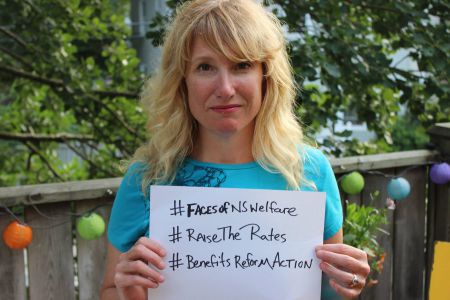KJIPUKTUK (Halifax) – A group of local poverty activists is launching a social media campaign to tackle the secrecy and stigma associated with receiving social assistance.
You hear it all the time. People on social assistance are milking the system at taxpayers' expense. Welfare recipients have nothing to contribute to society. They're lazy.
Those stereotypes are wrong, and they're dangerous, documentary maker, actor and writer Jackie Torrens tells the Halifax Media Co-op. Torrens, who proposed the campaign, joined forces with the Benefits Reform Action Group, a coalition of people on social assistance and their allies.
“People on assistance have been made to feel ashamed. But it is a shame that isn't theirs,” she says.
Getting beyond stereotypes is important, Torrens believes. For society, and also for the people who are on assistance.
“Busting that shame open, we can start talking about the things that desperately need to change. That people are hungry, that people don't have enough food,” Torrens says. “If you're supposed to be silent how can you even begin to talk about the issues and obstacles that are facing you?”
The social media campaign will feature photos of people who are or were on welfare or disability benefits, or otherwise have a personal connection. Each picture will also include a brief write-up of a personal experience with social assistance.
The idea is that we're everywhere, and that people on welfare are just people, say Torrens, who herself was once a teenage mother on welfare in Nova Scotia.
“The first snobbery and ideas about people on welfare were my own,” Torrens reflects on her own experience at the time. “I was so ashamed, I lied about it for years.
“I thought I was the exception to the rule, but everybody is an exception,” she says.
Torrens finds many people eager to lend their names to the campaign. Not a small thing, she says.
“It takes huge courage to say, yes I am on welfare, or I have been on welfare.” “The people who are currently on welfare are braver than I ever was,” Torrens says.
Already, prominent Nova Scotians such as Trailer Park Boys star and Studio Black director Cory Bowles, journalist Anne Theriault (Washington Post, Vice, The Belle Jar), actor and activist Hugo Dann, writer Jane Kansas and author and social business innovator Barb Stegemann (The 7 Virtues) have joined the campaign.
Others decline, illustrating the deep roots of welfare stereotypes in society.
One of the people currently on social assistance who did say yes is Aron Spidle.
Spidle had to seek social assistance in 2011, after a fall down a concrete stairs aggravated existing problems and made it impossible to hold a regular job.
Spidle has a college diploma and two university degrees. Inspired by his deeply held Christian faith, he volunteers at Veith House “on those days his body lets him.”
Spidle is also a member of the Community Advocates Network, an organization that for years has spoken up about poverty-related injustice. And he volunteers for the Monarchist League.
“It's important that people who aren't on social assistance understand that we are normal human beings, and that all those stereotypes don't really apply,” Spidle says.
“And it's also important that folks on social assistance understand that they are not alone, and that there is hope for a better tomorrow,” he adds.
One point that Spidle wants to get across is that success is not just measured by the job you hold or how much money you make.
“You can both be on social assistance, and be a success,” Spidle believes.
“Many folks on social assistance cannot work. Sometimes for physical or mental reasons, but also because of the punitive, restrictive nature of the system itself. Yet they volunteer, they do what they can to help their neighbours. They stay connected with their community,” he says.
“I may not be able to work in the traditional sense, but I give back to my community. I try to make a difference in people's lives, and contribute to the social capital of this city.”
Spidle is featured in a documentary on Nova Scotia's welfare system made by Torrens. The documentary will premiere later this month.
“Researching the situation right now, and living with people, and meeting with people who are on the system right now, it's harder to be on welfare right now than it was 25 years ago,” says Torrens. “And it was hard then.”
It's not too late to participate in #FacesofNSWelfare. Take a picture of yourself holding a sign with one or all three of the campaignhashtags:#FacesofNSWelfare #RaiseTheRates #BenefitsReformAction.
Then include a short paragraph that says who you are and your connection to income assistance, past or present. In your paragraph, you could even choose to highlight an issue of income assistance that you are most concerned about, such as shelter rates, lack of access to education, special needs, lack of adequate funds for food, etc.
The deadline to receive your pictures and short paragraph is September 12th, 2015.
Please send your pictures and paragraphs (and for more information) to Evan Coole at Dalhousie Legal Aid: evan.coole@dal.ca or 902 423 8105. Evan can also help if you need a bit of help, don't have a computer, and so on.
Click here for additional articles on Nova Scotia's Income Assistance system.
Follow Robert Devet on Twitter



